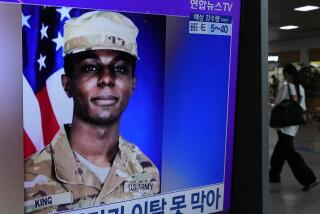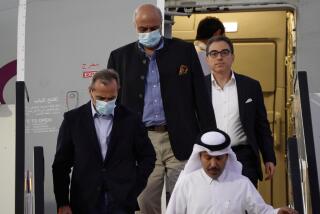U.S. Protests S. Korea Manhandling of Kim : Strong-Arming of Activist Assailed
WASHINGTON â The State Department, accusing South Korea of breaking an agreement to assure a smooth homecoming for Kim Dae Jung, filed a protest Friday over police strong-arm tactics in dealing with the opposition leader and his largely American entourage.
State Department spokesman Edward Djerejian, using far more tart language than the Reagan Administration usually directs at allies, called on the Seoul authorities to release Kim from house arrest as soon as possible. He also warned that the U.S. government will watch Kimâs treatment closely in the coming months.
âThere were understandings we thought we had with the Korean government which were not carried out,â Djerejian said.
Investigation Asked
âOur embassy protested and has asked the (South Korean) Foreign Ministry for an investigation, an explanation and guarantees of the proper treatment of the Americans accompanying Mr. Kim,â Djerejian said. âWe have received a promise of an investigation and assurances that the Republic of Korea government will assure the safety of the Americans.â
Despite the new controversy, Djerejian said there will be no change in plans for a visit to Washington in April by South Korean President Chun Doo Hwan.
Djerejian, designated by the White House to handle all official U.S. government reaction to Seoulâs treatment of the opposition leader, gave no hint of what the United States might do if the South Korean government fails to provide a satisfactory explanation of the incident. But South Korea depends heavily on U.S. support for its national security. About 40,000 U.S. troops are stationed there.
The Administration has been reluctant in the past to criticize non-Communist authoritarian governments, like that in South Korea, on the theory that they are less repressive than Communist regimes. But the State Department was clearly angry about the treatment of Kim and his 37-person delegation, which included two members of the House of Representatives--Reps. Edward F. Feighan (D-Ohio) and Thomas M. Foglietta (D-Pa.).
âThe regrettable events of today are only part of the story,â Djerejian said. âMr. Kimâs treatment by the Korean authorities in coming weeks and months will continue to be something that we will follow closely, as we will follow and work to encourage political liberalization in Korea.
âIt seems to me that restraint and compromise would help Korea achieve the goal of a more liberal political atmosphere that all, including the Korean government, espouse,â he said.
South Korean officials denied that Kim or those with him had been beaten, and said the authorities, mindful of the parallels drawn with the 1983 slaying of Philippine opposition leader Benigno S. Aquino Jr., had acted only to ensure Kimâs safety.
Patricia Derian, one American in the group that accompanied Kim on his return to South Korea from self-imposed exile in the United States, called the incident at the Seoul airport âthuggery at its height.â Derian is a former assistant secretary of state for human rights in the Jimmy Carter Administration.
OâNeill Deplores Incident
On Capitol Hill, House Speaker Thomas P. (Tip) OâNeill Jr. (D-Mass.) said he deplored âthe apparent physical abuse of Kim Dae Jung and the Americans accompanying him. . . . I call on President Chun to personally guarantee the safety and security of Mr. Kim and the members of Congress who are with him.â
Djerejian volunteered a detailed account of the incident at the start of the daily State Department briefing. He said the Seoul government had informed the United States in advance of plans for an orderly homecoming.
âThe arrival scenario did not, of course, go as it should have,â he said. âU.S. Embassy officers, who had been promised access to the disembarking congressmen (in Kimâs entourage), were initially denied access by South Korean authorities at the scene, a fact which we deplore.â He added that if the embassy personnel had been allowed to reach the scene, they âmight have prevented this incident.â
âIt is our understanding that Mr. Kim is not being allowed to leave his home,â Djerejian said. âWe hope that these restrictions on Mr. Kim will be lifted as soon as possible. We regret any steps . . . that could be interpreted as not advancing the cause of political liberalization in Korea.â
More to Read
Sign up for Essential California
The most important California stories and recommendations in your inbox every morning.
You may occasionally receive promotional content from the Los Angeles Times.










